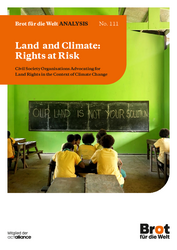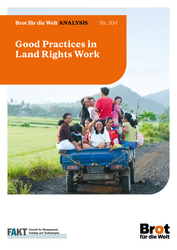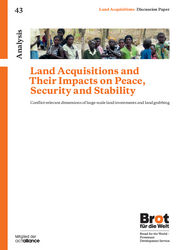
For Land Rights and just peace
Conflicts over land are multiplying worldwide, fuelled by various factors as speculation, land concentration or large-scale investments in land. Land is grabbed by powerful elites or business actors, often without benefit for local land users.
In many cases violence is used to drive people from their ancestral lands. They are displaced and expropriated without their consent and become uprooted. This cycle of violence can be prevented when land rights are secured, conflicts are managed without use of violence and pro-poor land policies secure livelihoods and generate a vision of sustainable development and just peace.
Land Grabbing in the Global Context
As a result of the global financial and food crisis of 2008, farmland has become a precious resource for production and also an asset for financial investment. Data collection and advocacy work of civil society actors like the international NGO ‘GRAIN’ helped to get an idea about the size of the problem at global scale. Articles and studies about land acquisitions that lead to massive human rights violations, displacement and forced migration provided a better insight into the mechanisms, its drivers, actors, challenges and risks.
The International Land Coalition/ILC denounced in its “Tirana Declaration” (2011) the growing practice of “Land Grabbing” as phenomenon of land acquisition that is ignoring and violating human rights.
As an add-on to the growing world population, climate change, resource demanding production and consumption patterns and violent conflicts that are destroying harvests and arable land, Land Grabbing is increasing the pressure on land. Herewith, the competition for the limited resource land is rising and the risks for scaling-up land conflicts and disputes over land related other precious natural resources are manifold.
Land Grabbing Endangers Inclusiveness and Peace
The dispute over natural resources is one of the main causes of conflicts worldwide. Land Grabbing adds on the existing divides in the local societies and is often accompanied by social discontent and violence against those who demonstrate for their land rights and against large-scale projects and increases the risk of conflict escalation. Accountability for longterm consequences of the land deal for the affected local population and the unintended negative side effects like landlessness, human insecurity, loss of livelihood or forced migration are lacking.
The socio-economic and ecological impact of large-scale land investments and huge monocultures for instance of sugar cane, oil palms or soybeans for the global market, is often disastrous. Natural springs and wells are drying up; food is becoming scarce and expensive. In addition people are losing their income opportunities. Inclusive, peaceful and sustainable development is thus not possible.
Land Rights for a Life with Dignity
To prevent Land Grabbing, the land rights of local populations must be respected, protected and fulfilled. Conflicts need to be taken serious and dealt with in a constructive, inclusive and non-violent manner. Instead of Land Grabs for large-scale agro-industrial projects, rural regions need alternatives. These alternatives have to be developed jointly with the people affected and suited to their needs. Inclusive national land policies must be developed and implemented with meaningful involvement of all stakeholders.
A solid basis provide the "Voluntary Guidelines on the Responsible Governance of Tenure of Land, Fisheries and Forests" approved by the United Nations Committee on Food Security in 2012. These Guidelines promote tenure rights and equitable access to land, fisheries and forests.
Once these guidelines have been enshrined in national law, states must protect legitimate land rights, safeguard human rights, uphold the interests of the local population and compensate those affected by Land Grabs. Investors must be held accountable for the harm caused by their land deals, if necessary through legal action.
What Brot für die Welt does
Together with our partner organisations, we report about cases of Land Grabbing and document their effects. This results in clear demands towards politics, investors and businesses, locally as well as internationally and in Germany. With our partners, we demand binding national and international regulations that prevent Land Grabbing and displacement. We demand mandatory due diligence and better human rights standards for governments and investors. We request a clear Do No Harm Policy with more accountability and long-term commitment from government, development finance institutions and private sector. This policy has to prevent unintended negative effects of land based investments. We also request better exit strategies.
We therefore call on the German government to enhance its peacebuilding efforts
- to develop and implement international binding regulations that prevent Land Grabbing and other forms of violence in connection with land and natural resources
- to further actively promote the implementation of the VGGT as a binding document worldwide
- to actively follow-up on links between land and violence prevention and implement the 2017 adopted guidelines "Preventing Crises, Resolving Conflicts, Building Peace"
- and to pursue this also in all fields of international politics as for instance agriculture, climate, economic and trade and the Agenda 2030 / SDGs.
We support partner organisations which defend land rights and work for peace and human rights. We support them in protection and developing of security measures following a holistic security approach. Where necessary, we provide training, support for psycho-social rehabilitation and we enhance knowledge transfer and networking. In emergency situations we provide legal assistance and personal protection.
Video: Land Rights and Climate Change in Southeast Asia and the Pacific
Video: Sharing Good Practices in Land Rights Work
Downloads





